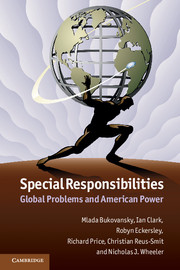4 - Climate change
Published online by Cambridge University Press: 05 June 2012
Summary
Environmental problems arrived relatively late on the agenda of international relations but they are now persistent and ubiquitous, having crept up, as it were, on a rapidly modernising world as the unintended and in many cases unforeseen side-effects of otherwise acceptable practices. These special features of environmental problems make the allocation of responsibility especially difficult and troublesome, and explain why they are often characterised as ‘wicked problems’. In this chapter, we focus on the wickedest of them all – the problem of human-induced climate change – which is destined to remain a permanent item on the international agenda for the foreseeable future.
The debate over who should take responsibility for climate change has become more urgent as the successive reports of the Intergovernmental Panel on Climate Change (IPCC) have become more confident about the seriousness of the problem and the window of opportunity for preventative action diminishes. The development of a low carbon global economy requires a massive transformation of social purpose and social practices at multiple levels of social aggregation. Few would deny that everyone should ‘play a role’ and share in the general responsibility to address such a major collective action challenge. Yet it does not follow that everyone should play the same role or take on the same responsibility, given the vast differences among individuals, households, communities, firms, organisations and states in terms of their historical contribution to the problem, capacities to respond and adapt, levels of income, development needs and vulnerability. The problem of climate change is especially pernicious from an ethical point of view because the impacts cannot be geographically quarantined to ensure that the big greenhouse gas emitters suffer impacts in proportion to their causal responsibility, or that the least culpable and most vulnerable are protected. Indeed, in many (though not all) cases, there is an inverse relationship between causal responsibility and capacity to respond, on the one hand, and vulnerability and under-development, on the other. These features suggest that the collective task of preventing dangerous climate change can be more fairly and effectively fulfilled by differentiating social roles and responsibilities among different social agents. Our task in this chapter is to examine how states have negotiated different roles and responsibilities to address climate change, with a particular emphasis on the roles and responsibilities of the US.
- Type
- Chapter
- Information
- Special ResponsibilitiesGlobal Problems and American Power, pp. 122 - 162Publisher: Cambridge University PressPrint publication year: 2012



